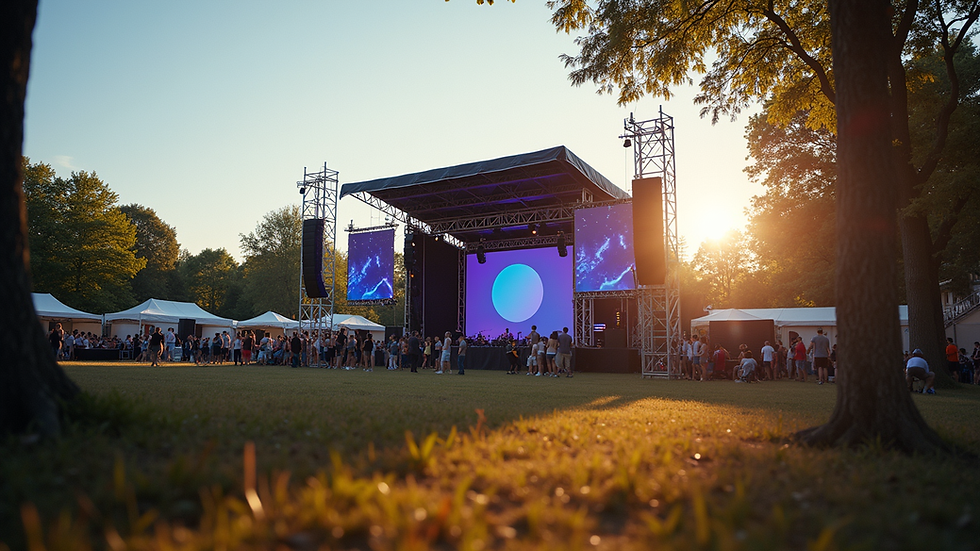"The Ultimate Checklist for Your First AV Event"
- Denzel Merritt

- Aug 9, 2024
- 3 min read
Updated: Aug 27, 2024
Planning your first AV event can be both exhilarating and daunting. Whether it’s a corporate gathering, wedding, concert, or any other occasion, the stakes are high, and the details matter. To help you navigate this complex process, we’ve created a comprehensive checklist that outlines everything you need to consider. From venue selection to equipment needs, this guide will set you on the right path for a successful event. Let’s dive in!
---
#1. Define the Event Purpose and Goals
Before you do anything else, clarify the purpose of your event. Is it a corporate conference, a wedding celebration, a product launch, or a community festival? Knowing your goals will guide every decision you make moving forward.
- Who is your target audience?
- What message or experience do you want to convey?
Setting clear objectives will help inform your choices for venue, equipment, and marketing strategies.
---
#2. Budget Planning
Creating a budget is essential for any event planner. Here’s how to break it down:
- Fixed Costs: Venue rental, permits, insurance, and staffing.
- Variable Costs: Catering, AV equipment, decorations, and marketing.
- Contingency Fund: Always set aside 10-15% of your budget for unexpected expenses.
Using budgeting software or templates can help you keep track of these expenses. Start with a rough estimate and adjust as you gather more information.
---
#3. Venue Selection
Choosing the right venue is crucial. Here are several factors to consider:
- Capacity: How many attendees are you expecting? Make sure the venue can comfortably accommodate your guests.
- Location: Is it easily accessible? Consider parking, public transport, and accommodations for out-of-town guests.
- AV Capabilities: Does the venue have built-in audio-visual equipment, or will you need to bring your own? Check the acoustics and lighting conditions.
- Ambiance: The venue’s aesthetic should align with the event’s theme.
Tip: Visit potential venues in person and take notes on what works and what doesn’t.
---
#4. Equipment Needs
Understanding your AV equipment requirements is essential. Here’s a list to get you started:
- Audio Equipment: Microphones (wired, wireless, and lapel), speakers, mixers, and monitors.
- Visual Equipment: Projectors, screens, LED walls, and lighting.
- Recording Equipment: Cameras for live streaming or recording the event.
- Staging: Stages, risers, and backdrops, depending on your event type.
Checklist:
- Create a detailed inventory of the equipment you need.
- Determine whether you will rent or purchase equipment. Renting is often more cost-effective for one-time events.
---
#5. Staffing and Personnel
Your team is critical to the event’s success. Here are the roles you need to consider:
- Event Planner/Coordinator: Oversees all aspects of the event.
- AV Technicians: Responsible for setting up and managing equipment.
- DJs or Performers: Source the right talent that fits your event’s theme.
- Security Personnel: Ensure the safety of your guests and assets.
Tip: Create a schedule that outlines each person’s duties and responsibilities.
---
#6. Permits and Insurance
Don’t overlook the legal aspects of event planning:
- Permits: Depending on your location and event type, you may need permits for noise, alcohol, or public gatherings. Research local regulations.
- Insurance: Liability insurance protects you in case of accidents or damages. Speak with an insurance agent to understand your options.
Tip: Start this process early to avoid last-minute complications.
---
#7. Marketing and Promotion
Effective marketing is key to attracting your target audience. Here are some strategies to consider:
- Social Media: Utilize platforms like Facebook, Instagram, and LinkedIn to promote your event. Create a dedicated event page.
- Email Marketing: Send invitations and updates to your mailing list.
- Local Advertising: Use flyers, posters, or local media to reach your audience.
- Collaborations: Partner with influencers or local businesses to expand your reach.
Tip: Create a content calendar to plan your marketing strategy well in advance.
---
#8. Day-of Event Checklist
On the day of the event, having a checklist will keep you organized:
- Arrival Time: Arrive early to oversee setup and deal with any last-minute issues.
- Equipment Testing: Test all AV equipment to ensure everything is functioning properly.
- Staff Briefing: Hold a quick meeting to go over the schedule and address any concerns.
- Guest Management: Ensure there are clear signs for registration and event flow.
Tip: Have a backup plan ready for any technical issues that may arise
Conclusion:
With this first event AV Checklist, you’ll be well on your way to organizing a successful event. For more tips, visit MixStarAudio.com!





Comments